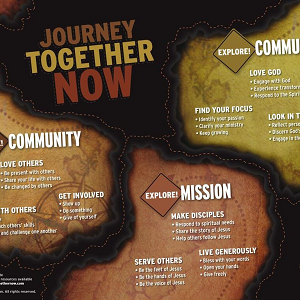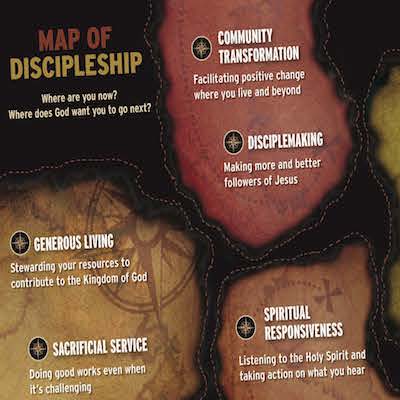The Leadership Difference
Have you ever felt like you weren’t fully equipped for your leadership role?
Like you needed a bit more practical guidance in the “what-to-dos” of ministry?
Like the barriers you’re running up against aren’t specifically theological but are more about how to lead people and get along with them as you work together?
I graduated from seminary at the wise age of 24. Much to my astonishment, no churches were calling me to become their pastor. Eventually someone suggested that maybe I should start a new church, so I agreed. What did I have to lose? I was assigned to a particular community and went around knocking on doors, talking with people about what they wanted—and didn’t want—in a church.
I quickly came to understand that my seminary experience didn’t fully prepare me for the reality of ministry in today’s world. As a leader, I needed to learn the Bible and how to pastor a church. However there are effective and ineffective ways to lead in ministry. Therefore — in addition to learning the Bible and theology — we can also learn some practical skills from others who have gone before us.
If you’re looking for practical skills and strategies to help you grow your leadership skills, The Leadership Difference is written for you.
- Discernment and focus
- Effective self-care
- Who you need on your team
- Team-building essentials
- Developing people through coaching
- Leading change
- Communication skills
- Supervising staff
- Organizational development
- Financial and legal practicalities
- Empowering and releasing new leaders
Anyone in a position of leadership, whether they’re leading a church, a team, or a small group, needs skills and strategies like these — skills and strategies that result in lightening your own load, developing the skills of others, and getting the job done effectively.
Click below to read a few excerpts from The Leadership Difference. This book is available now!
When I was pastoring a church, I taught a newcomers class. After the last class, a woman named Iris came up to me and said, “Bob, this class was excellent. I learned so much and grew so much. It was really helpful to me. Could I give you some feedback?” “Sure.” “This class was horribly disorganized.”
She was right; I recognized the truth of what she said immediately. I’m decent at winging it, but I’d been making up the class as I went, bringing in random handouts each week, without a clear idea of next steps. But then Iris continued, “Could I help you fix that?”
Iris was a mother of pre-schoolers, a stay-at-home mom in search of a challenge. She wanted something different from the challenges of stay-at-home parenting, yet something she could do at the same time. So Iris became a ministry organizer for me. I’d always been able to do a little bit of organizing myself–that’s how I got that class off the ground in the first place—but not enough to make it truly functional. I needed Iris on my team.
I’ve always said, “If you want to know my weaknesses, look at the strengths of the people around me.” I prefer the big picture to the details. I’ve gotten better at managing the details over time– I’ve had to– but it’s never been an area of strength for me. Inevitably things fall through the cracks. So at various seasons of my life, I’ve had some amazing administrative help: people like Iris. I mean truly gifted people who can take a crazy schedule and whip it into a semblance of order. People who can find the document I need for the next meeting before I remember that I needed it. I stand in awe of these people and they have contributed significantly to every ministry I’ve been a part of over the years. No matter who you are, you can’t go it alone. You need to mobilize other people around you.
Every believer is called to be a disciple. But not every believer is called to be a leader. For those who are, what additional competencies do they need for effective leadership?
Any competencies along these lines would answer the question, “What does a leader need to do?” Consider the daily and weekly life of some Christian leaders you respect. What do you see them doing? There may be some obviously pastoral things like preaching or doing hospital visits or leading a group or Bible study, but look deeper too. They are probably also developing and investing in newer leaders. They are probably engaging in ongoing growth or spiritual practices in their own life.
Then of course, things come up. They may be dealing with interpersonal conflicts. They may be trying to get the church on course in a different direction. They may be overseeing other staff or volunteers. They may be planning and implementing new ministry initiatives. There are many possibilities, and the most effective leaders know how to do the right thing at the right time.
Very early on in my ministry when I was an intern, I was frequently late for staff meeting. Eventually, my supervisor took me aside and said, “You’re not late because you didn’t run fast enough. You’re late because you didn’t start early enough.” That was one of my early lessons in time management… and in personal development.
Sometimes people don’t connect the so-called “practical skills”—things like managing your time and money—with deeper character issues. But they are intrinsically related. Where do our actions come from? Our behaviors are rooted in the way we see life, what we value, what we really believe. Actions are a far better indicator of the heart than words.
Looking for resources for your next study group?
If you’re looking for something to use with your next study group, consider the Leadership Skills Guides. This comprehensive set of guides covers 37 essential leadership skills. Each guide includes a written introduction, teaching points, scripture passages and reflection, and discussion questions. Every topic has participant guides to hand out to those you are training and leader guides for yourself that give you a bit more content. There’s even a section that lays out various options for covering the material with those you’re training. Click below to learn more.
-

Disciple Assessment Retreat Guide
$0.00 -

Fundamentos bíblicos del Coaching
$0.00 -

Preguntas de Entrenamiento (coaching) para el Mapa de Discipulado
$0.00 -

Coaching Questions for the Journey Together Now Guides
$0.00 -

Mapa del Discipulado
$0.00 -

Map of Discipleship
$0.00 -

Missional Coach Competencies
$0.00 -

Biblical Basis for Coaching
$0.00 -

Questions for Facilitating a Small Group
$0.00 -

Grupos de Transformación de Vida (GTV)
$0.00 -

Life Transformation Group (LTG)
$0.00 -

Coaching Questions for 12 Life Commitments
$0.00

